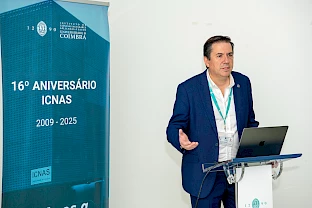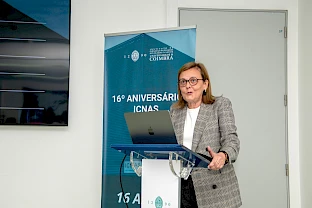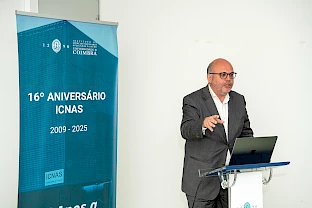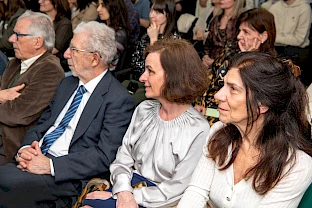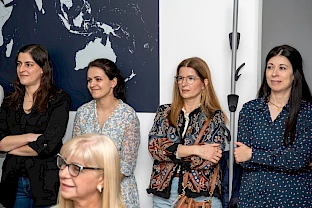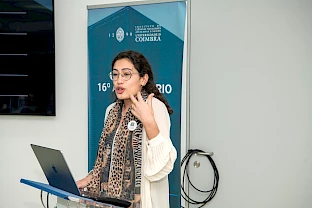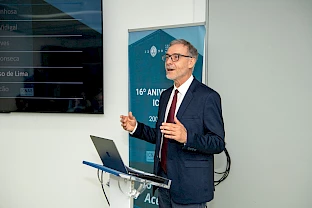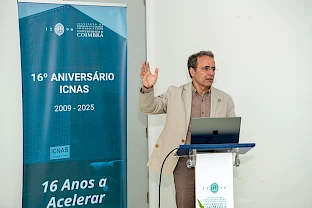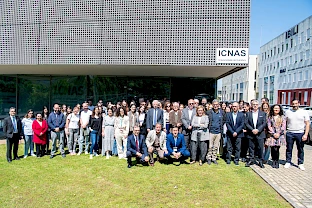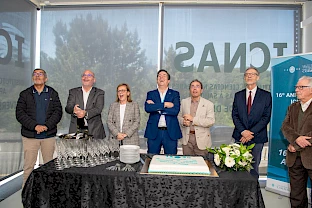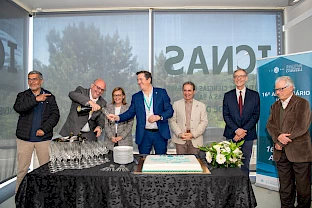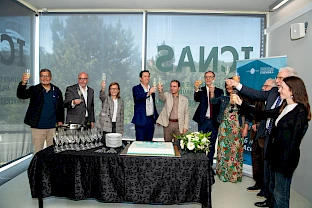ICNAS sets goal of becoming a teaching unit
ICNAS celebrated its anniversary and also launched the second edition of the "JJ Pedroso de Lima Prize". Applications are open from 1 May to 30 June.
The Institute of Nuclear Sciences Applied to Health (ICNAS) at the University of Coimbra (UC) celebrated its 16th anniversary on 24 April, bringing together dozens of people at its facilities.
"ICNAS would not have achieved its success without being anchored in two institutions as prestigious as the Faculty of Pharmacy and the Faculty of Medicine at the University of Coimbra," said its Director, Antero Abrunhosa.
With a team of around 120 people, including over 40 PhD students, Abrunhosa expressed his ambition for ICNAS to "one day become a teaching unit".
During the ceremony, all speakers paid tribute to Professor João José Pedroso de Lima, underlining his importance and legacy. The second edition of the "JJ Pedroso de Lima Award" was launched during the event, with applications open from 1 May to 30 June.
Established last year, the €10,000 award honours João José Pedroso de Lima, "an eminent physicist and full professor at the University of Coimbra", and recognises "students, lecturers or researchers with a background in the fundamental sciences and engineering" who excel "with outstanding projects in the field of nuclear sciences applied to health".
UC Rector Amílcar Falcão stated that the award is "more than deserved" and expressed his hope that it would endure as a "perpetual tribute".
The winner of the first edition of the "JJ Pedroso de Lima Prize", Alexandra Fonseca, shared her experience as a more recent member of the ICNAS community. She emphasised the environment of "trust, where it is possible to make mistakes, try again, and rebuild". Fonseca added that "ICNAS is the result of a vision that goes far beyond the immediate future", recognising that "we are contributing to something greater than ourselves".
During the event, Antero Abrunhosa highlighted several recent achievements of ICNAS over the past year. These included the organisation of a European symposium, with the challenge of "hosting an international event organised by the team every year", further raising Coimbra’s profile internationally. He also pointed out the "Excellent" rating awarded by the Portuguese Foundation for Science and Technology (FCT) to the ICNAS Centre for Biomedical Imaging and Translational Research (CIBIT), achieving the maximum score of five out of five. Abrunhosa also noted the success of CIBIT’s Summer School, "an event so popular that at midnight we had to encourage people to leave".
UC Rector Amílcar Falcão took the opportunity to recall a major milestone in the history of ICNAS: contributing to the European Pharmacopoeia, the set of official standards for pharmaceutical substances and medicines.
"We at ICNAS have made an impact on the European Pharmacopoeia," he said, referring to the "production of Gallium-68, which is now patented" and calling it "a source of immense pride".
Gallium-68 is a radionuclide used in cancer diagnosis, valued for its high yield, low cost, and reduced waste.
In conclusion, the Rector stated that "ICNAS will continue to grow and have a bright future".
The commemorative session also included addresses by ICNAS Deputy Director Maria João Vidigal, ICNAS researcher Francisco Alves, and Professor João Pedroso Lima, a family member of João José Pedroso de Lima.
Further information about ICNAS and the second edition of the "JJ Pedroso de Lima Award" is available at www.uc.pt/icnas.

